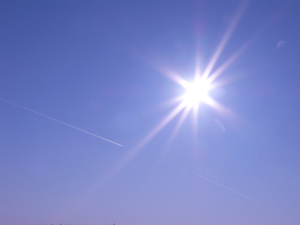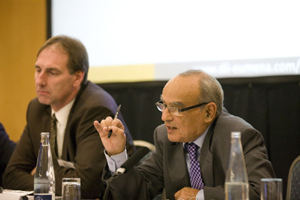Desertec sees positive side to political change
on
Desertec sees positive side to political change
With North Africa in the grip of political turmoil, doubts have arisen about the prospects of the Desertec Industrial Initiative (Dii), which aims to launch a renewable energy revolution in the region. But representatives from Desertec view the current developments as a positive rather than a negative factor for their plans. 'What we offer is employment and economic opportunities for the growing populations of North Africa and the Middle East', says Mouldi Miled, Executive Director of the new Desertec University Network, which was set up recently to coordinate renewable energy research in North Africa. 'That is exactly what the people here demand.'
 |
| 'The post-revolutionary situation will be better than the previous one' |
‘I am very confident that the post-revolutionary situation will be better than the previous one. We will have more transparency, a better business environment. This will be good for investors.’ Mouldi Miled, a retired Tunisian businessman, is the Executive Director (and one of the founders) of the Desertec University Network (DUN), a new platform for scientific cooperation within the Desertec programme, founded in October last year. DUN already has over twenty members, including many prominent universities and research institutions in Egypt, Algeria, Jordan, Libya, Morocco, Tunisia as well as in Germany, Italy, France and Switzerland.
Although DUN was set up by the Desertec Foundation in cooperation with the Tunisian National Advisory Council for Scientific Research and Technology, and its founding document was signed in Tunis before the revolution, Mouldi Miled is unfazed by the political changes taking place in his country. In fact, he is speaking to EER on the telephone from an office at the Ministry of Higher Education and Scientific Research in Tunis, where it’s business as usual. ‘What we are doing is help the country grow economically, to stimulate research and development and the creation of high-tech jobs. That is precisely what is needed by the young people who are demanding political changes.’
Mouldi Miled points out that the renewable energy projects that the Desertec Industrial Initiative (Dii) is seeking to implement in Tunisia are particularly well suited to be carried out in remote areas. That too should appeal positively to the Tunisian people. ‘The projects will be located in the desert, far from the coast, and will promote local growth. That’s important because right now there is a big development gap between the coastal region and the inland regions in Tunisia. That is one of the reasons for the uprising that took place here.’
Domestic needs
Paul van Son, the CEO of Dii, is similarly positive about the changes taking place in North Africa. He says the activities of Dii are now more important than ever, not only for the prosperity in the countries in North Africa, but for Europe too. ‘A new energy partnership with the countries south of the Mediterranean
| 'A new energy partnership with the countries south of the Mediterranean makes a lot of sense, especially now' |
As to Tunisia, Van Son says: ‘Desertec can help turn Tunisia into one of the key countries in North Africa, from which renewable energy can spread to other countries in the region.’
Mouldi Miled stresses that the primary objective of the Desertec initiative is to stimulate renewable energy production to meet growing domestic needs in the MENA region. ‘There is a misconception in Europe that Desertec is intended to generate solar power in the Sahara for export to Europe. But export to Europe is only a secondary goal, though not unimportant, as it can help pay for the investments that are needed. But we first of all need the energy for ourselves. Our growing populations use ever more energy. And we need energy badly for water desalination. All the countries here have water shortages and these will only get worse.’
 |
| Miled: 'The North African region represents unique challenges that are not encountered in Europe' |
Sandstorms
DUN is not just important because there is a lack of know-how in North Africa, but also because new knowledge needs to be acquired that is tailor-made to the situation in North Africa. ‘The North African region represents unique challenges that are not encountered in Europe, such as sandstorms and water shortages’, says Mouldi Miled. In an industry survey recently held by CSPToday.com, sandstorms were indicated as one of the most challenging technical factors for building solar power plants in the desert, in addition to shortages of water and grid connections. ‘We need to develop new systems that are adapted to our environment’, says Mouldi Miled. ‘To do this we need to acquire manufacturing know-how and train researchers. This is what DUN will do.’
Mouldi Miled, a retired businessman who used to be active in the telecommunications sector, says he has taken this task upon himself because he strongly believes in the Desertec vision. ‘Basically it’s an economic issue. Our countries need to develop renewable energy resources. In Tunisia we don’t have fossil fuels, but we do have sun. There is no economic security if we continue to be dependent on oil.’
The Tunisian government is strongly committed to boosting energy efficiency and the share of renewable energy, says Miled. ‘We have little renewable energy now, but our goal is to supply 20% of
| 'We should make it clear that we are not asking for charity' |
Mouldi Miled does stress the importance of boosting “public acceptance” of the Desertec projects. ‘We need to show that our projects provide employment and education. That is the best guarantee for success.’ The same, in fact, goes for the EU, Mouldi Miled notes. ‘ People in Europe also need to be convinced that this is a win-win proposition, and not a threat somehow. We should make it clear that we are not asking for charity. We think our projects can be profitable and that they will increase security of supply for Europe, not diminish it.’
|
Morocco ahead of Tunisia When it comes to “green” energy in North Africa it is not Tunisia, but Morocco that currently seems furthest advanced. The Moroccan government has set up an agency, the Moroccan Agency for Solar Energy (MASEN), which is responsible for the implementation of an ambitious program to create 2,000 MW of solar power by 2020. Tenders have already been completed for the first 500 MW. Desertec Industrial Initiative (Dii) has now announced it will be participating in the second phase of the Moroccan power plan, which will consist of a cluster of solar thermal plants, photovoltaic (PV) projects and wind parks. The first electricity generated by this pilot project could be fed into the Moroccan grid by 2015/16, says Dii. The Moroccon pilot project is one of three “reference projects” that Dii wants to start up before the end of 2012. Dii views itself primarily as an “enabler”. That is, it will not make investments itself, but it will focus on helping to create a suitable framework for investments in renewable power production and grids in the MENA region. However, to demonstrate the ‘fundamental viability’ of the Desertec vision, Dii has decided to help bring about three “reference projects”. In addition to the one in Morocco, Dii is conducting a second feasibility study in Tunisia for a 500 MW solar and wind project in the desert. One advantage that Morocco has over other North African countries is that it has a grid connection with Spain, so part of the new green power produced in Morocco could be exported to Europe. This does not necessarily mean, however, that renewable energy produced in Morocco will be eligible for EU support. Although the EU’s Renewable Energy Directive makes it possible for countries to meet part of their renewable energy targets by importing renewable energy from third countries (article 9), such “joint projects” have to meet with very strict conditions, to ensure that they are not detrimental to the production of renewable energy inside the EU. European Energy Commissioner Günther Oettinger, who has shown himself to be a strong proponent of Desertec, has said he will try to explore the possibilities to support “joint projects” with North African countries. Another barrier to the import of green energy into the EU, is the hodgepodge of different national support schemes that currently exist in Europe for renewable energy. Imports rarely qualify for subsidies under any of these national schemes. For Desertec, a single European support programme would be much more desirable, but that is politically a no-go area for the time being. Oettinger has indicated that the European Commission likes to see harmonisation in the long term, but few member states are willing to let go of their national schemes. |
|
German government committed At a recent “Parlementarischen Abend” in Berlin, Minister of Economic Affairs Rainer Brüderle and other German politicians gave enthusiastic support to Desertec before an audience of over 500 people. |
|
And what about the costs of solar power? Solar power cannot yet compete with traditional forms of power, but according to Paul van Son, CEO of the Desertec Industrial Initiative (Dii), the gap should be closed somewhere between 2020 and 2030. This is one of the objectives Dii is pursuing by helping to create a pipeline of projects which will lead to economies of scale. |


Discussion (0 comments)